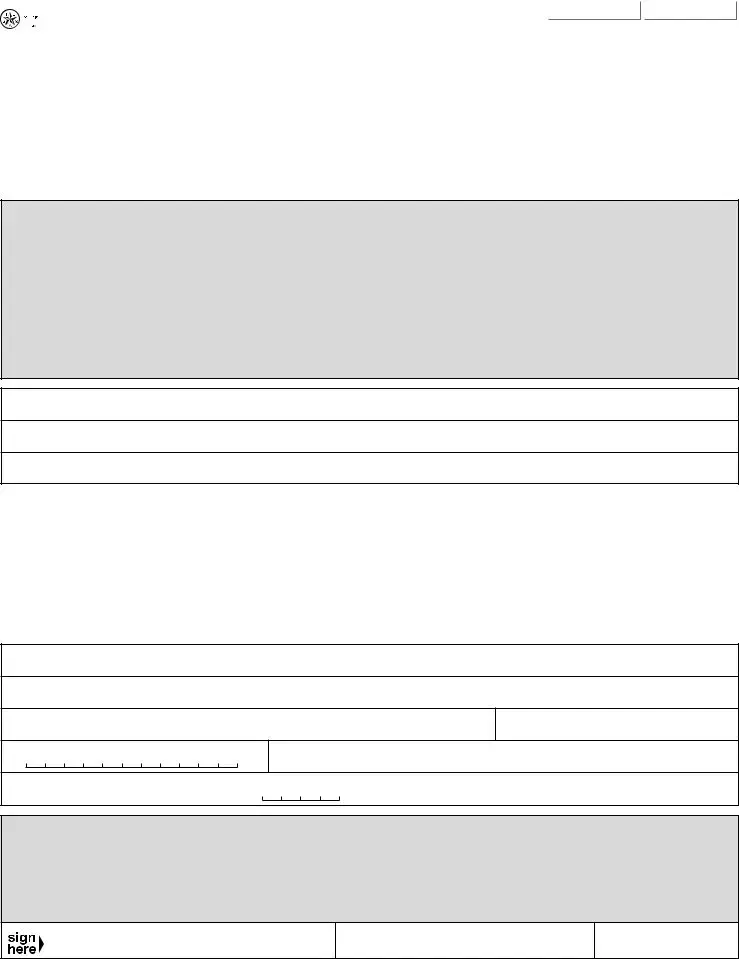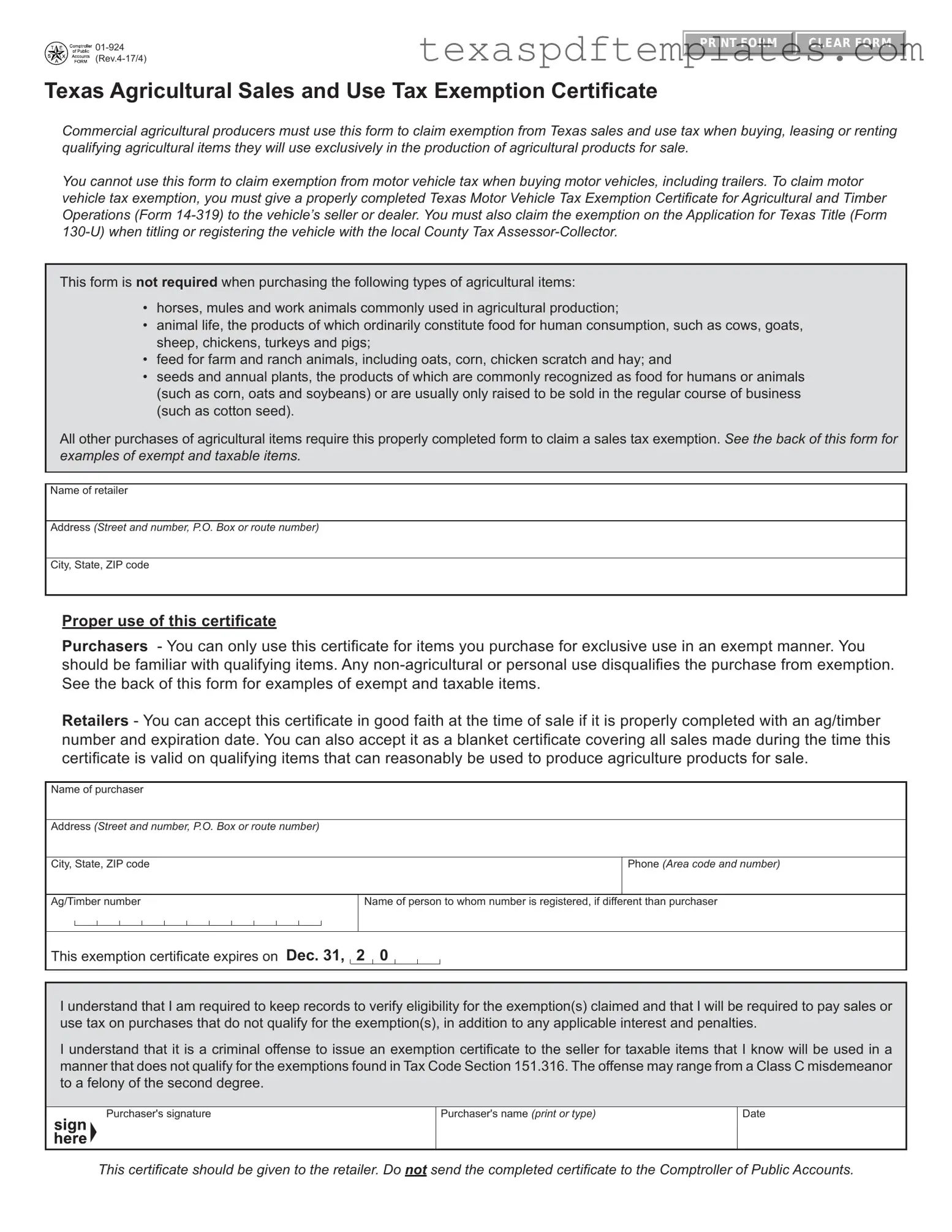Blank Texas 01 924 PDF Template
Form Example




















PRINT FORM |
CLEAR FORM |
|
|
Texas Agricultural Sales and Use Tax Exemption Certificate
Commercial agricultural producers must use this form to claim exemption from Texas sales and use tax when buying, leasing or renting qualifying agricultural items they will use exclusively in the production of agricultural products for sale.
You cannot use this form to claim exemption from motor vehicle tax when buying motor vehicles, including trailers. To claim motor vehicle tax exemption, you must give a properly completed Texas Motor Vehicle Tax Exemption Certificate for Agricultural and Timber Operations (Form
This form is not required when purchasing the following types of agricultural items:
•horses, mules and work animals commonly used in agricultural production;
•animal life, the products of which ordinarily constitute food for human consumption, such as cows, goats, sheep, chickens, turkeys and pigs;
•feed for farm and ranch animals, including oats, corn, chicken scratch and hay; and
•seeds and annual plants, the products of which are commonly recognized as food for humans or animals (such as corn, oats and soybeans) or are usually only raised to be sold in the regular course of business (such as cotton seed).
All other purchases of agricultural items require this properly completed form to claim a sales tax exemption. See the back of this form for examples of exempt and taxable items.
Name of retailer
Address (Street and number, P.O. Box or route number)
City, State, ZIP code
Proper use of this certificate
Purchasers - You can only use this certificate for items you purchase for exclusive use in an exempt manner. You should be familiar with qualifying items. Any
Retailers - You can accept this certificate in good faith at the time of sale if it is properly completed with an ag/timber number and expiration date. You can also accept it as a blanket certificate covering all sales made during the time this certificate is valid on qualifying items that can reasonably be used to produce agriculture products for sale.
Name of purchaser
Address (Street and number, P.O. Box or route number)
City, State, ZIP code
Phone (Area code and number)
Ag/Timber number
Name of person to whom number is registered, if different than purchaser
This exemption certificate expires on Dec. 31, 2 0
I understand that I am required to keep records to verify eligibility for the exemption(s) claimed and that I will be required to pay sales or use tax on purchases that do not qualify for the exemption(s), in addition to any applicable interest and penalties.
I understand that it is a criminal offense to issue an exemption certificate to the seller for taxable items that I know will be used in a manner that does not qualify for the exemptions found in Tax Code Section 151.316. The offense may range from a Class C misdemeanor to a felony of the second degree.
Purchaser's signature
Purchaser's name (print or type)
Date
This certificate should be given to the retailer. Do not send the completed certificate to the Comptroller of Public Accounts.

Form
Always Exempt
These items are always exempt and do not require an exemption certificate or an ag/timber number.
•Horses, mules and work animals commonly used in agricultural production;
•Animal life, the products of which ordinarily constitute food for human consumption, such as cattle, goats, sheep, chickens, turkeys and hogs;
•Feed such as oats, hay, chicken scratch, wild bird seed and deer corn for livestock and wild game (pet food is not exempt); and
•Seeds and annual plants, the products of which are commonly recognized as food for humans or animals, such as corn, oats and soybeans or for fiber, such as cotton seed.
Exempt
Here are examples of items that are exempt from sales tax when used exclusively on a farm or ranch to produce agricultural products for sale and pur- chased by a person with a current ag/timber number.
Air tanks
Augers
Bale transportation equipment
Baler twine
Baler wrap
Balers
Binders
Branding irons
Brush hogs Bulk milk coolers Bulk milk tanks
Calf weaners and feeders
Cattle currying and oiling machines
Cattle feeders
Chain saws used for clearing fence lines or pruning orchards
Choppers
Combines
Conveyors
Corn pickers
Corral panels
Cotton pickers, strippers
Crawlers – tractors
Crushers
Cultipackers
Discs
Drags
Dryers
Dusters
Egg handling equipment
Ensilage cutters
Farm machinery and repair or replacement parts
Farm tractors Farm wagons
Farrowing houses (portable and crates)
Feed carts
Feed grinders
Feeders
Fertilizer
Fertilizer distributors
Floats for water troughs
Foggers
Forage boxes
Forage harvesters
Fruit graters
Fruit harvesters
Grain binders
Grain bins
Grain drills
Grain handling equipment
Greases, lubricants and oils for qualifying farm machinery and equipment
Harrows
Head gates
Hoists
Husking machines
Hydraulic fluid
Irrigation equipment
Manure handling equipment Manure spreaders Milking equipment
Mowers (hay and rotary blade)
Pesticides
Pickers
Planters Poultry feeders
Poultry house equipment
Pruning equipment
Rollbar equipment Rollers
Root vegetable harvesters
Rotary hoes
Salt stands
Seed cleaners
Shellers
Silo unloaders
Soilmovers used to grade farmland
Sorters
Sowers
Sprayers
Spreaders
Squeeze chutes
Stalls
Stanchions
Subsoilers
Telecommunications services used to navigate farm machinery and equipment*
Threshing machines Tillers
Tires for exempt equipment Troughs, feed and water
Vacuum coolers
Vegetable graders
Vegetable washers
Vegetable waxers
* As of Sept. 1, 2015, telecommunications services used to navigate farm machinery and equipment are exempt.
Taxable
These items DO NOT qualify for sales and use tax exemption for agricultural production.
•Automotive parts, such as tires, for vehicles licensed for highway use, even if the vehicle has farm plates
•Clothing, including work clothing, safety apparel and shoes
•Computers and computer software used for any purposes other than agricultural production
•Furniture, home furnishings and housewares
•Golf carts, dirt bikes, dune buggies and
•Guns, ammunition, traps and similar items
*See
•Materials used to construct roads or buildings used for shelter, housing, storage or work space (examples include general storage barns, sheds or shelters)
•Motor vehicles and trailers*
•Pet food
•Taxable services such as nonresidential real property repairs or remodeling, security services, and waste removal
Tax Help: www.comptroller.texas.gov/taxes/ = Window on State Government: www.comptroller.texas.gov
Tax Assistance:
Sign up to receive email updates on the Comptroller topics of your choice at www.comptroller.texas.gov/subscribe.
More PDF Templates
How Many Board Members Are Required for a Nonprofit in Texas - Any changes to the corporation's name require an amendment to the certificate of formation.
Home Building Association - All participants in the construction process can benefit from the robust outline of responsibilities provided in this package.
Common mistakes
-
Inaccurate Completion of the Ag/Timber Number: Many individuals fail to provide a valid ag/timber number or mistakenly enter an incorrect one. This number is crucial for verifying eligibility for the exemption.
-
Failure to Understand Eligible Items: Some purchasers do not familiarize themselves with the list of qualifying agricultural items. This can lead to claiming exemptions on items that do not qualify, resulting in potential penalties.
-
Improper Use of the Certificate: The certificate is intended solely for items purchased for exclusive use in agricultural production. Using it for personal or non-agricultural purposes disqualifies the exemption.
-
Neglecting to Keep Records: Individuals often overlook the requirement to maintain records that verify eligibility for the claimed exemptions. Failure to do so can lead to complications if the exemption is questioned.
-
Missing Signature or Date: Some people submit the form without a signature or date. This omission can render the certificate invalid, leading to the denial of the exemption.
-
Not Submitting to the Correct Entity: Individuals mistakenly send the completed certificate to the Comptroller of Public Accounts instead of providing it directly to the retailer. This can delay or complicate the exemption process.
Key takeaways
Here are some important points to keep in mind when filling out and using the Texas 01-924 form:
- Purpose of the Form: This form is specifically for commercial agricultural producers to claim exemption from Texas sales and use tax on qualifying agricultural items.
- Exemption Limitations: The form cannot be used for motor vehicle tax exemptions. For vehicles, a different form (Texas Motor Vehicle Tax Exemption Certificate for Agricultural and Timber Operations) is necessary.
- Non-Exempt Items: Certain agricultural items, like horses and animal feed, do not require this certificate for exemption. Familiarize yourself with these items to avoid unnecessary paperwork.
- Proper Use: Ensure that the items purchased with this certificate are used exclusively for agricultural purposes. Any personal or non-agricultural use disqualifies the exemption.
- Record Keeping: It is essential to keep records that verify eligibility for the claimed exemptions. You may need to pay taxes on purchases that do not qualify.
- Certificate Validity: The exemption certificate has an expiration date. Ensure that it is completed correctly and provided to the retailer at the time of purchase.
Steps to Using Texas 01 924
Completing the Texas 01-924 form is an essential step for agricultural producers seeking to claim a sales and use tax exemption. The following steps will guide you through the process of filling out this form accurately, ensuring that you meet the necessary requirements.
- Obtain a copy of the Texas 01-924 form. You can print it from the Texas Comptroller’s website or acquire it from a local tax office.
- Begin by filling in the Name of retailer field. Enter the full name of the retailer from whom you are purchasing the items.
- Next, provide the Address of the retailer. Include the street address, P.O. Box, or route number, followed by the City, State, ZIP code.
- Move to the Name of purchaser section. Fill in your full name as the purchaser of the agricultural items.
- In the Address field, enter your complete address, including street address, P.O. Box, or route number, along with the City, State, ZIP code.
- Provide your phone number in the Phone section, including the area code.
- Enter your Ag/Timber number. If the number is registered under someone else’s name, fill in the Name of person to whom number is registered field.
- Indicate the expiration date of the exemption certificate. This date is typically December 31 of the current year.
- Read the statement regarding record-keeping and the legal implications of issuing the exemption certificate. Acknowledge your understanding by signing the form.
- Print or type your name in the Purchaser's name field.
- Finally, enter the date on which you are completing the form.
Once you have filled out the form, it should be given to the retailer at the time of purchase. Remember, do not send the completed certificate to the Texas Comptroller of Public Accounts. Keep a copy for your records to verify eligibility for the exemption claimed.
